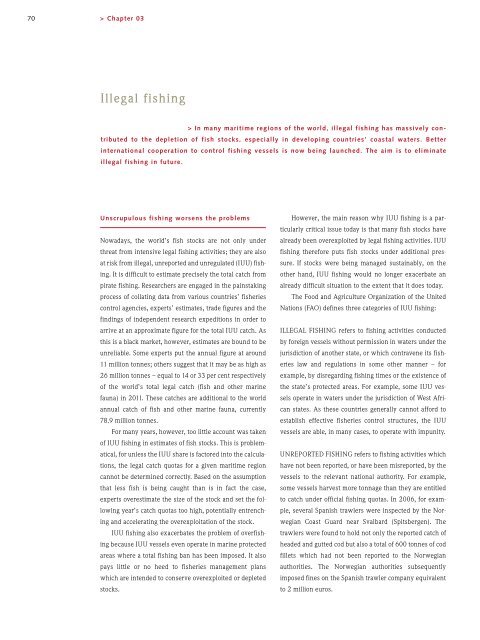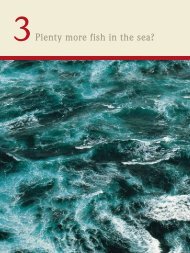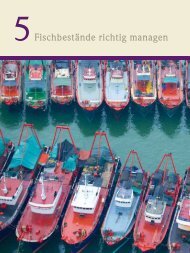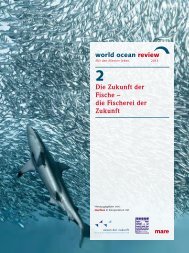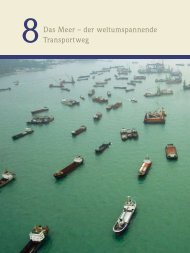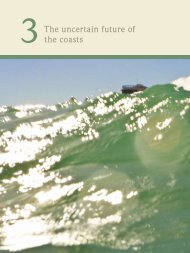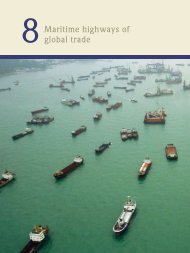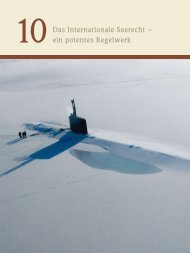Download WOR 2 PDF - World Ocean Review
Download WOR 2 PDF - World Ocean Review
Download WOR 2 PDF - World Ocean Review
You also want an ePaper? Increase the reach of your titles
YUMPU automatically turns print PDFs into web optimized ePapers that Google loves.
70> Chapter 03Illegal fishing> In many maritime regions of the world, illegal fishing has massively contributedto the depletion of fish stocks, especially in developing countries’ coastal waters. Betterinternational cooperation to control fishing vessels is now being launched. The aim is to eliminateillegal fishing in future.Unscrupulous fishing worsens the problemsNowadays, the world’s fish stocks are not only underthreat from intensive legal fishing activities; they are alsoat risk from illegal, unreported and unregulated (IUU) fishing.It is difficult to estimate precisely the total catch frompirate fishing. Researchers are engaged in the painstakingprocess of collating data from various countries’ fisheriescontrol agencies, experts’ estimates, trade figures and thefindings of independent research expeditions in order toarrive at an approximate figure for the total IUU catch. Asthis is a black market, however, estimates are bound to beunreliable. Some experts put the annual figure at around11 million tonnes; others suggest that it may be as high as26 million tonnes – equal to 14 or 33 per cent respectivelyof the world’s total legal catch (fish and other marinefauna) in 2011. These catches are additional to the worldannual catch of fish and other marine fauna, currently78.9 million tonnes.For many years, however, too little account was takenof IUU fishing in estimates of fish stocks. This is problematical,for unless the IUU share is factored into the calculations,the legal catch quotas for a given maritime regioncannot be determined correctly. Based on the assumptionthat less fish is being caught than is in fact the case,experts overestimate the size of the stock and set the followingyear’s catch quotas too high, potentially entrenchingand accelerating the overexploitation of the stock.IUU fishing also exacerbates the problem of overfishingbecause IUU vessels even operate in marine protectedareas where a total fishing ban has been imposed. It alsopays little or no heed to fisheries management planswhich are intended to conserve overexploited or depletedstocks.However, the main reason why IUU fishing is a particularlycritical issue today is that many fish stocks havealready been overexploited by legal fishing activities. IUUfishing therefore puts fish stocks under additional pressure.If stocks were being managed sustainably, on theother hand, IUU fishing would no longer exacerbate analready difficult situation to the extent that it does today.The Food and Agriculture Organization of the UnitedNations (FAO) defines three categories of IUU fishing:ILLEGAL FISHING refers to fishing activities conductedby foreign vessels without permission in waters under thejurisdiction of another state, or which contravene its fisherieslaw and regulations in some other manner – forexample, by disregarding fishing times or the existence ofthe state’s protected areas. For example, some IUU vesselsoperate in waters under the jurisdiction of West Africanstates. As these countries generally cannot afford toestablish effective fisheries control structures, the IUUvessels are able, in many cases, to operate with impunity.UNREPORTED FISHING refers to fishing activities whichhave not been reported, or have been misreported, by thevessels to the relevant national authority. For example,some vessels harvest more tonnage than they are entitledto catch under official fishing quotas. In 2006, for example,several Spanish trawlers were inspected by the NorwegianCoast Guard near Svalbard (Spitsbergen). Thetrawlers were found to hold not only the reported catch ofheaded and gutted cod but also a total of 600 tonnes of codfillets which had not been reported to the Norwegianauthorities. The Norwegian authorities subsequentlyimposed fines on the Spanish trawler company equivalentto 2 million euros.


